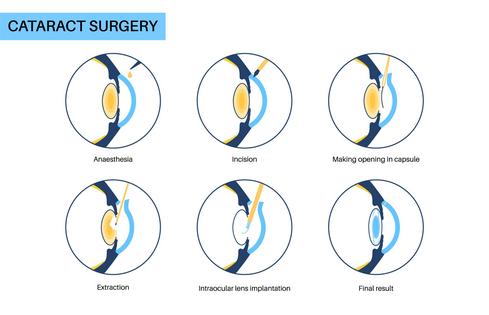Is It Safe To Have Cataract Surgery? Understanding Benefits and Risks
Published in Health Articles
Cataract surgery is one of the most common and effective procedures performed worldwide. As people age, cataracts, which cloud the eye’s lens, often impair vision. The good news is that cataract surgery offers a safe and efficient way to restore clarity to vision. However, as with any surgery, there are concerns regarding safety, benefits, and potential risks. Understanding these aspects is crucial for anyone considering this procedure. But is it safe to have cataract surgery?
This article explores the safety of cataract surgery, delving into its benefits and risks, while helping patients make informed decisions regarding their eye health.
How Cataract Surgery Works
Cataract surgery involves removing the clouded lens of the eye and replacing it with a clear artificial lens called an intraocular lens (IOL). The procedure typically takes about 10-20 minutes per eye, and most patients return home the same day. It’s also considered a highly successful operation, with most patients experiencing significant improvements in their vision.
In most cases, cataract surgery is performed on an outpatient basis and is minimally invasive. Two primary techniques are available, such as the phacoemulsification and extracapsular surgery. Moreover, patients can also explore the different types of cataract surgery to understand better which method might be most appropriate for their condition.
The Benefits of Cataract Surgery
Cataract surgery offers numerous benefits. These include:
Improved Vision Quality
One of the most significant advantages of cataract surgery is the immediate improvement in vision. Patients often report enhanced clarity, sharpness, and color vibrancy, which were dulled by the cataracts. This improvement can significantly boost a person’s quality of life, especially if the cataracts impair daily activities such as reading, driving, or recognizing faces.
Reduced Dependence on Glasses
Many individuals find that their need for prescription glasses decreases dramatically after cataract surgery. Advanced intraocular lenses (IOLs) allow surgeons to correct common refractive errors such as nearsightedness, farsightedness, and astigmatism. Multifocal IOLs can also provide patients with clear vision at different distances, reducing or eliminating the need for bifocals or reading glasses.
Safe and Fast Recovery
Cataract surgery is renowned for its safety and fast recovery period. Most patients experience only minor discomfort and can return to normal activities within a few days. Complete healing typically occurs within four to six weeks. Post-surgery complications are also rare, and advancements in technology and surgical techniques continue to enhance safety and recovery times.
Prevention of Further Vision Loss
If left untreated, cataracts can worsen, eventually leading to blindness. Cataract surgery prevents this progressive vision loss and ensures patients can maintain their independence and enjoy a better quality of life as they age. Furthermore, timely surgery is especially crucial for individuals whose cataracts interfere with their ability to work or safely navigate their surroundings.
Risks Associated with Cataract Surgery
While cataract surgery is considered one of the safest medical procedures, it’s essential to understand that no surgery is without risk. Patients should be aware of the potential complications, even though they occur in a tiny percentage of cases. These include:
Infection and Inflammation
As with any surgical procedure, there’s a slight risk of infection following cataract surgery. Surgeons take meticulous steps to minimize this risk by using sterile techniques and prescribing antibiotic eye drops post-surgery. Inflammation is also possible but is usually managed effectively with anti-inflammatory medications.
Posterior Capsule Opacification (PCO)
One of the more common complications after cataract surgery is posterior capsule opacification, often referred to as a “secondary cataract.” This occurs when the back of the lens capsule becomes cloudy, leading to blurry vision. PCO is treatable with a quick, painless laser procedure called a YAG laser capsulotomy, which restores clear vision.
Retinal Detachment
Though rare, cataract surgery slightly increases the risk of retinal detachment. This happens when the retina separates from its supportive tissue. Retinal detachment is a serious condition requiring prompt medical intervention, and patients should be aware of the symptoms, such as a sudden increase in floaters, flashes of light, or a shadow over the field of vision.
Increased Eye Pressure
Some patients may experience elevated eye pressure after surgery, a condition known as ocular hypertension. This is usually temporary, but in some cases, it could lead to glaucoma if not managed properly. As such, regular follow-up visits with the surgeon are essential to monitor eye pressure and prevent long-term complications.
Who Is a Good Candidate for Cataract Surgery?
Most individuals who develop cataracts are considered good candidates for cataract surgery, primarily if the cataracts are affecting their quality of life. However, a few considerations determine whether a patient is ready for surgery. These include:
Vision Impairment
Candidates for cataract surgery are generally those whose vision has been impaired by the cataracts. If activities like driving, reading, or watching television have become difficult or unsafe, surgery is often recommended.
Overall Eye Health
A thorough examination of the eye is necessary before surgery. Patients with other eye conditions, such as glaucoma, retinal diseases, or dry eye syndrome, may require additional treatments or considerations before undergoing cataract surgery.
General Health
Cataract surgery is a minor procedure, but patients with certain medical conditions, such as uncontrolled diabetes or immune system disorders, may face additional risks. Hence, patients need to discuss their full medical history with their doctor before deciding.
Final Thoughts
Cataract surgery is a well-established and safe procedure that can vastly improve a person’s vision and quality of life. By keeping the information mentioned above in mind, patients can confidently move forward with a procedure that could restore their vision and help them maintain an active, independent lifestyle. Remember, regular follow-ups and close communication with the eye care team are key to ensuring long-term success after cataract surgery.
























Comments